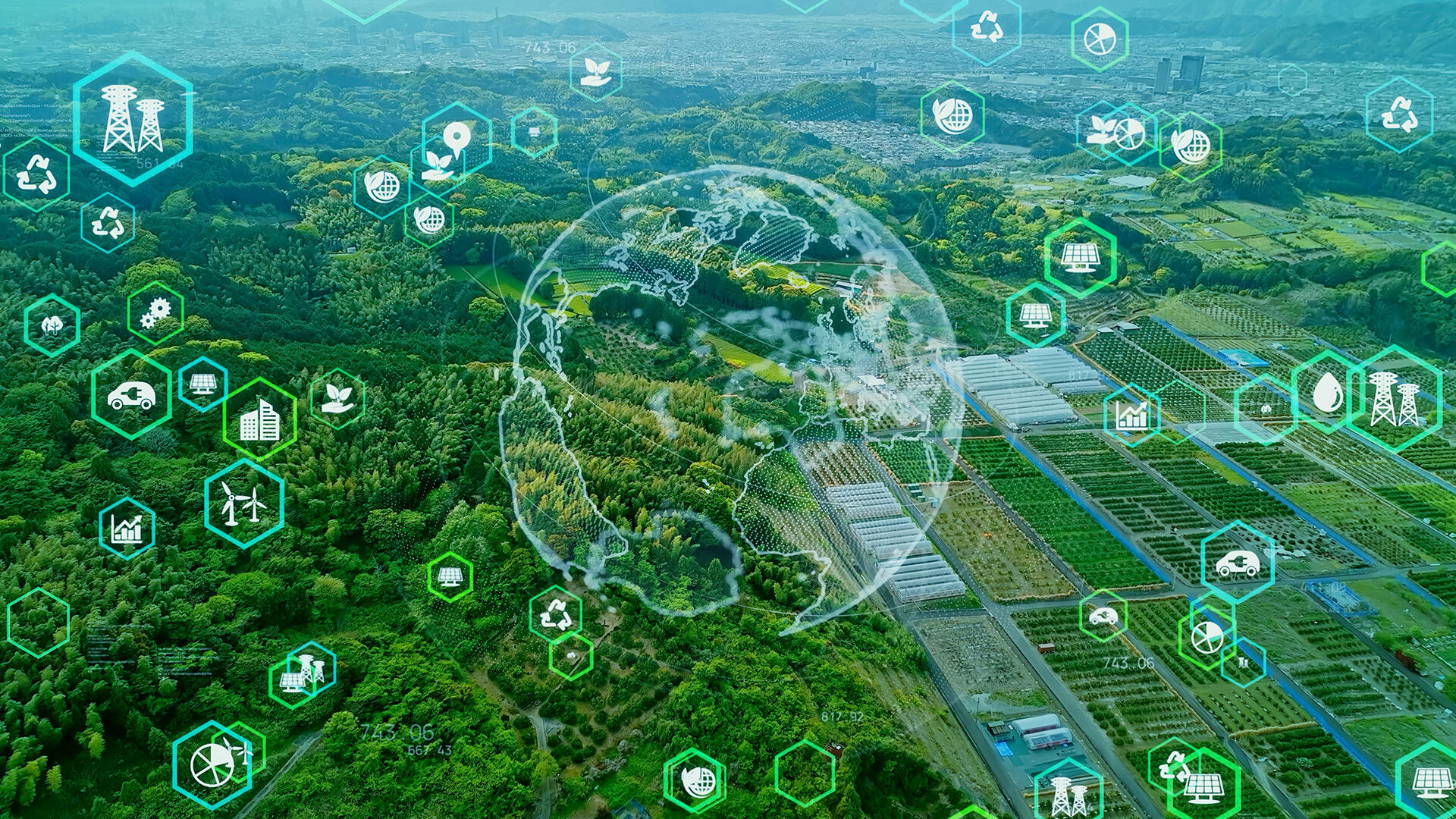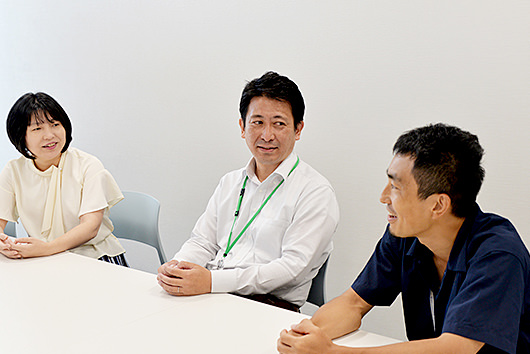Efforts towards GX are accelerating in order to achieve carbon neutrality by 2050. We spoke with Kumiko KAJII, Chief Technical General Manager and General Project Manager of ESG Sustainable Smart City about what the national and local governments, private companies, and citizens should each do to promote this goal, as well as the current status and challenges of the initiative.
INDEX
- What is GX (Green Transformation)?
- How Does the World Work?
- How Is Japan's GX Progressing?
- What Are the Challenges Facing Japan's GX?
- What Is Expected of Construction Consultants in Promoting GX?
- GX support service examples
What is GX (Green Transformation)?
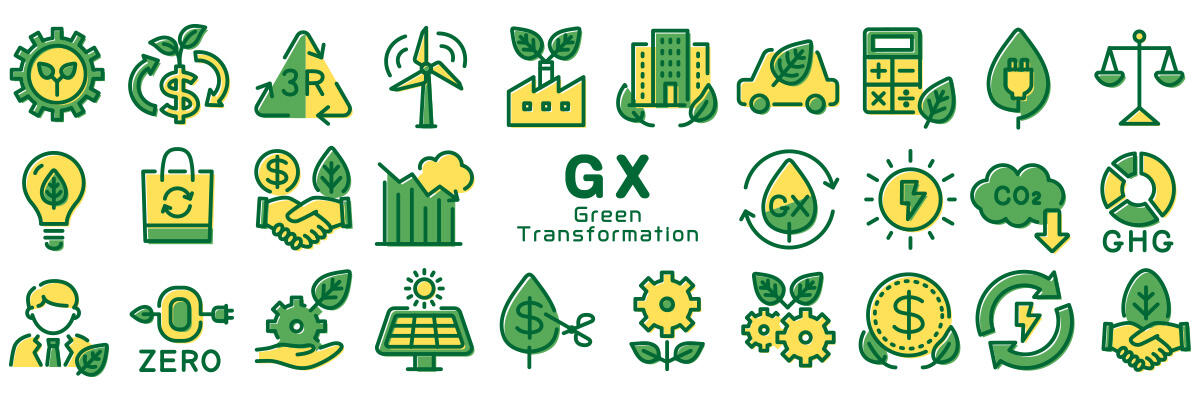
What is GX (Green Transformation)?
GX is an abbreviation for Green Transformation, and refers to the shift from the fossil fuel-centered industrial and social structures that have existed since the Industrial Revolution to a clean energy-centered structure.
Through GX, Japan aims to simultaneously achieve (1) carbon neutrality by 2050, as an international commitment, (2) a shift in the energy supply and demand structure that will enable a stable energy supply, and (3) economic growth.
These three goals have been addressed in the past, and the idea and concept of enabling sustainable development while enriching the economy and society through environmental measures has been around for more than 20 years. So why GX again? It is because Japan now believes that it is necessary to accelerate the realization of carbon neutrality by making full use of economic methods such as supporting large-scale decarbonization investments nationwide and forming new markets and rules represented by carbon pricing (emissions trading, etc.). GX was set up for this purpose, and specifically, it has been revealed that GX investments on the scale of 150 trillion yen will be realized over the next 10 years through public-private cooperation. For this reason, the GX Executive Committee was established, and various government measures and private initiatives are being developed to realize GX.
Difference from Carbon Neutral
GX and carbon neutral do not mean the same thing. Carbon neutral refers to a state in which the emissions and absorption of greenhouse gas that cause global warming are in balance, and are essentially zero overall. Carbon dioxide (CO2) makes up the majority of greenhouse gas, and efforts that focus on reducing CO2 emissions are specifically called "decarbonization."
Specifically, reducing CO2 emissions can be achieved by reducing the use of fossil fuels through energy conservation and the use of renewable energy, while CO2 absorption can be achieved through the proper management and restoration of absorption sources such as forests, cultivated land, and coastal areas. Recently, technology to avoid and remove CO2 emissions has also been attracting attention.
The technologies required for GX are also technologies that shift from fossil fuels to clean energy and can be said to have a carbon-neutral effect, but GX is a concept that combines economic methods (investment promotion, carbon pricing, finance) to accelerate the spread of these technologies and promote the transformation of industrial structure. In other words, GX is a concept that aims to simultaneously achieve carbon neutrality and strengthen industrial competitiveness by leveraging economic methods.
How Does the World Work?
Leading trends in Europe and the US
Europe and the United States are much more advanced in their efforts toward carbon neutrality than Japan.
The EU has already launched the "European Green Deal" in 2019, which aims to achieve carbon neutrality by 2050, and is actively working on the transition to renewable energy. The "European Green Deal" is not just an environmental policy, but is positioned as an EU growth strategy, with the aim of attracting industries that contribute to decarbonization into the EU and securing their advantages. In addition, the Emissions Trading Scheme (EU-ETS) has been in place since 2005.
The UK has announced that it will reduce Greenhouse Gas Emissions by more than 68% compared to 1990 levels by 2030, and achieve carbon neutrality by 2050. The country is actively working to expand the introduction of large-scale renewable energy sources such as offshore wind power, as well as hydrogen. At the same time, it has launched a platform-like organization called the Net Zero Hub to provide steady support and promote decarbonization through small-scale decentralized renewable energy sources at the local level.
The United States has also announced that it will reduce Greenhouse Gas Emissions by 50-52% compared to 2005 levels by 2030, and achieve carbon neutrality by 2050. It plans to make large-scale budgetary investments in clean energy sectors such as infrastructure, the automobile industry, and the power sector.
Asian countries are also actively working on this issue. China has declared that it will peak its CO2 emissions by 2030 and achieve carbon neutrality by 2060, and has established a nationwide emissions trading system as a policy tool for reducing CO2 emissions, with trading already underway.
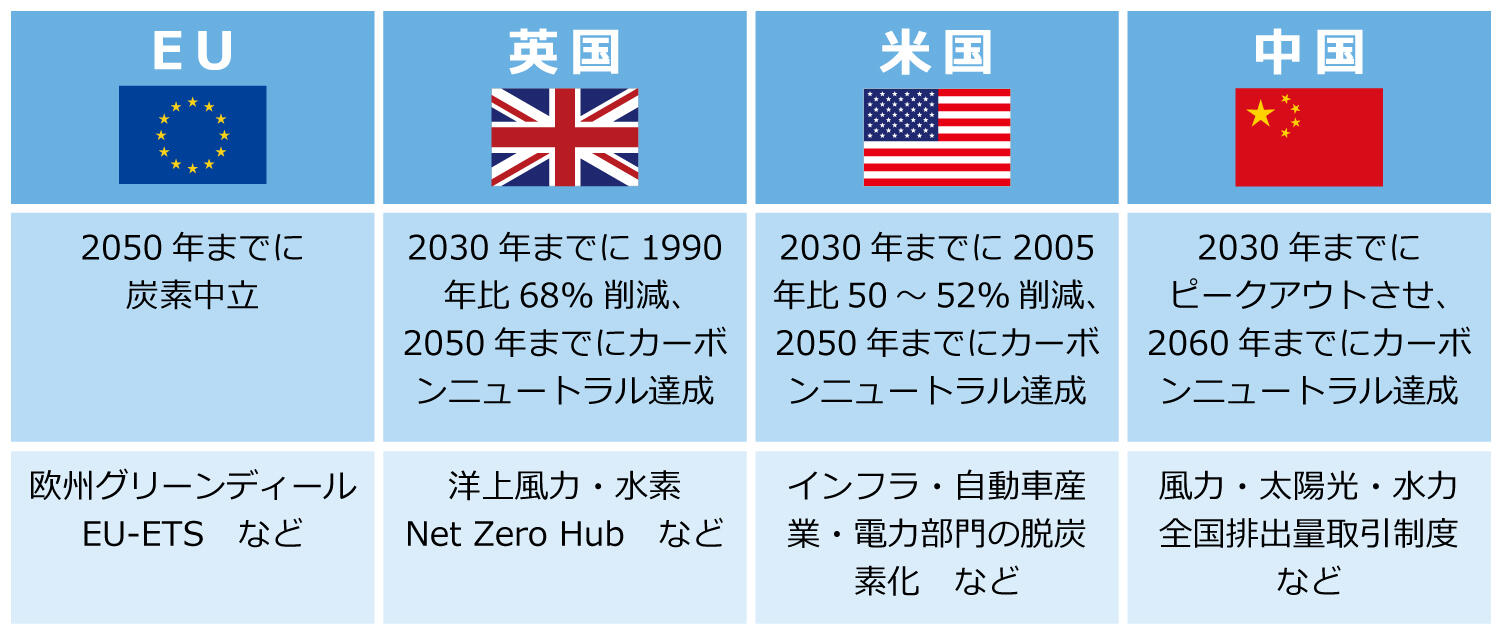
How Is Japan's GX Progressing?
Relevant ministries and agencies are implementing various measures
Japan has been somewhat behind the international community in its efforts, but in October 2020, then Prime Minister Suga declared that the country would aim to achieve carbon neutrality by 2050. The following April, 2021, he announced that "as an ambitious goal consistent with the 2050 target, we aim to reduce greenhouse gas by 46% compared to fiscal 2013 levels in fiscal 2030. Furthermore, we will continue to challenge ourselves to reach the 50% target."
- GX basic policy, GX promotion strategy
In addition, the "Grand Design and Implementation Plan for New Capitalism," approved by the Cabinet in June 2022, lists "investment in GX" as one of the priority investments, and the "Basic Policy for Realizing GX" was approved by the Cabinet in Feb. 2023, followed by the "Decarbonized Growth Economic Structure Transition Promotion Strategy (GX Promotion Strategy)" in July of the same year. These policies and strategies list the promotion of energy conservation, making renewable energy the main power source, utilizing nuclear power, and other efforts such as hydrogen and ammonia as technical measures, as well as the "Growth-oriented Carbon Pricing Initiative" to support upfront investments using GX economic transition bonds, providing GX investment incentives through carbon pricing, utilizing new financial methods, international strategies, and GX for small and medium-sized enterprises.
As part of this effort, the GX League was established with the aim of working on a Japanese version of voluntary emissions trading (GX-ETS), and as of Feb. 2024, 679 companies, accounting for more than 40% of Japan's CO2 emissions, have joined the league.
Other initiatives underway include the following:
- Leading decarbonization regions
A decarbonization pioneering region is a region that aims to achieve virtually zero CO2 emissions associated with electricity consumption in the residential sector, mainly in homes, offices, and other places of business, at the regional level, and also to make every effort to reduce greenhouse gas emissions in the transportation sector and heat utilization.
Led by local governments, local companies, and financial institutions, and with active support from the national government, primarily the Ministry of the Environment, the plan is to select at least 100 pioneering regions for decarbonization by fiscal 2025, pave the way for pioneering efforts, and put them into action by fiscal 2030. Already, 73 proposals from 94 cities, towns, and villages in 36 prefectures across the country have been selected (as of Mar. 18, 2024).
- Ministry of Land, Infrastructure, Transport and Tourism's Green Challenge
Ministry of Land, Infrastructure, Transport and Tourism has put together six priority projects to strategically tackle the realization of a green society, including carbon neutrality and responding to the climate crisis. Some of these projects (such as coexistence with nature) have different objectives than GX and carbon neutrality, but most of them also contribute to GX and carbon neutrality.
- Smart and resilient lifestyles and urban development leading to energy conservation and the expansion of renewable energy
- Creating a nature-friendly community using green infrastructure
- Building transportation, logistics and infrastructure systems to accommodate the electrification of automobiles
- Development of sustainable transportation and logistics services using digital and green technologies
- Achieving carbon neutrality and promoting greening in the port and maritime sectors
- Achieving carbon neutrality throughout the entire life cycle of infrastructure and a recycling-oriented society
Based on the GX Basic Policy, the Ministry of Land, Infrastructure, Transport and Tourism, Transport and Tourism's Green Society Realization Promotion Headquarters is currently conducting studies to further promote measures that will contribute to the transformation of the economy and society toward decarbonization of transportation, buildings, infrastructure, etc. (as of Jun., 2024).
- Electricity and Energy Policy
In order to maximize the introduction of renewable energy, which is one of GX's main measures, it is necessary to expand the introduction of conventional renewable energy technologies and implement next-generation renewable energy technologies in society, as well as to realize a robust next-generation power network that will enable a society where renewable energy is widely used. For example, energy management technologies and power networks that enable flexible adjustment of supply and demand according to the characteristics of renewable energy are indispensable. Currently, along with the development and enhancement of wide-area grids, markets are being formed to trade the value of various types of electricity (such as the capacity market, the supply-demand adjustment market, and the non-fossil value trading market) based on the premise of such flexible energy management.
In addition, the entire electricity and energy system is changing at a dizzying pace, such as the transition from the FIT system to the FIP system and the long-term decarbonized power supply auction system.
- Establishment of a Joint Credit Mechanism with 29 countries
The JCM (Joint Credit Mechanism system, an abbreviation for Joint Crediting Mechanism) is a system that quantitatively evaluates the contribution to greenhouse gas emission reductions and absorption obtained through the diffusion of Japan's excellent decarbonization technologies (including products, systems, services, and infrastructure) and implementation of measures in developing countries and other countries, and uses the results to help Japan achieve its national reduction targets. As of Feb. 2024, JCM has been established with 29 countries.
What Are the Challenges Facing Japan's GX?
In promoting GX, the nation, local governments, private companies, and each individual citizen have various roles to play. The nation and local governments are required to improve and strengthen systems and mechanisms that make it easier for private companies and citizens to take decarbonization measures, especially mechanisms that effectively provide economic incentives. Private companies are required to reduce CO2 emissions from their own business activities, as well as to seize the GX movement as a business opportunity and actively develop and provide products and services that contribute to reducing/absorbing CO2 emissions. Each individual citizen is also required to actively choose products and services that have a low environmental impact, as well as to support companies that provide them, in addition to actions such as energy conservation, reuse and recycling, and using public transportation in daily life, and the introduction of energy-saving and renewable energy equipment.
There are several challenges to overcome in moving forward with this initiative.
For example, many local governments and companies have faced economic challenges such as how to raise the necessary funds and how to balance business costs and profitability. The country's various GX policies (investment promotion, carbon pricing, establishment of financial methods, etc.) are precisely responses to these challenges, and it will be important for local governments and companies to make good use of these national support measures and systems in the future. For this reason, it is hoped that systems will be developed to enable a world in which companies with high CO2 emissions bear more of the costs and companies with low CO2 emissions receive more benefits.
In terms of technical issues, there is the challenge of building an energy management system, which is indispensable for the realization of the introduction of renewable energy, which is the most central measure of GX. In addition to simply increasing distributed energy resources such as solar, wind, and small hydropower, it is necessary to have technologies and systems that skillfully match energy supply and demand while skillfully combining storage batteries and other technologies. This is not something that can be done by a single company, but it is something that various businesses, residents, and local governments in the region must work together on. Without this management system, it is difficult to expand the introduction of renewable energy, and this technical solution is a major issue.
Furthermore, when promoting GX initiatives, it is important to maximize the effects in terms of the original aims of carbon neutrality, stable energy supply, and strengthening industrial competitiveness, but at the same time, it is important to find a way to avoid trade-offs with environmental and social aspects and maximize synergies as much as possible. For example, we must avoid a situation in which the introduction of large-scale renewable energy is promoted without sufficient consideration for the surrounding natural environment, which ultimately leads to disaster risks and the deterioration of biodiversity. It is difficult to find the best solution in all aspects, but it is important to continue making efforts to find a solution that is as optimal as possible overall.
What Is Expected of Construction Consultants in Promoting GX?
Construction consultants play a major role in the development of social infrastructure, and they have an important role and responsibility to incorporate technologies that will reduce or absorb CO2 emissions into projects from the beginning, so as to prevent CO2 emissions from being locked in.
Once built, cities and infrastructure will continue to be used for decades. Therefore, if they are not designed from the beginning with a structure that contributes to carbon neutrality, such as being energy-efficient and using renewable energy, they may continue to emit CO2 for many decades to come. Changing the structure midway through the process will incur extra costs and effort. It is important to think about ways to minimize CO2 emissions (or enable the absorption or removal of CO2) from the concept and planning stages in advance.
Furthermore, in cities and infrastructure, we must consider not only the reduction of CO2 emissions that occurs from the time they are built and in operation, but also the total reduction of CO2 emissions from the manufacturing, transportation, and on-site construction of materials used in structures, and even the final disposal stage. The volume of material handled in the development of cities and infrastructure is extremely large, and reducing CO2 emissions and increasing absorption over this entire life cycle is expected to ultimately produce a major effect.
GX support service examples
As a consulting service, PACIFIC CONSULTANTS supports the decarbonization of social infrastructure and local communities, and through these efforts, helps resolve various social issues.
Regarding social infrastructure, we support the formulation of national-level policies and guidelines for the decarbonization of airports, ports, roads, railways, dams, and erosion control facilities. Recently, we have been working with individual infrastructure management companies and local governments as clients to support on-site implementation, such as the formulation of specific plans and designs for decarbonization. Regarding regional decarbonization, our group has supported several regions that are pioneers in decarbonization, one of which is Shikaoi Town in Hokkaido, which has won various awards, including New Energy Grand Award, for the implementation of a microgrid. Microgrids are also one of the effective solutions to energy management, which is a major challenge in expanding the introduction of renewable energy, and our company has already implemented several microgrids in Japan.
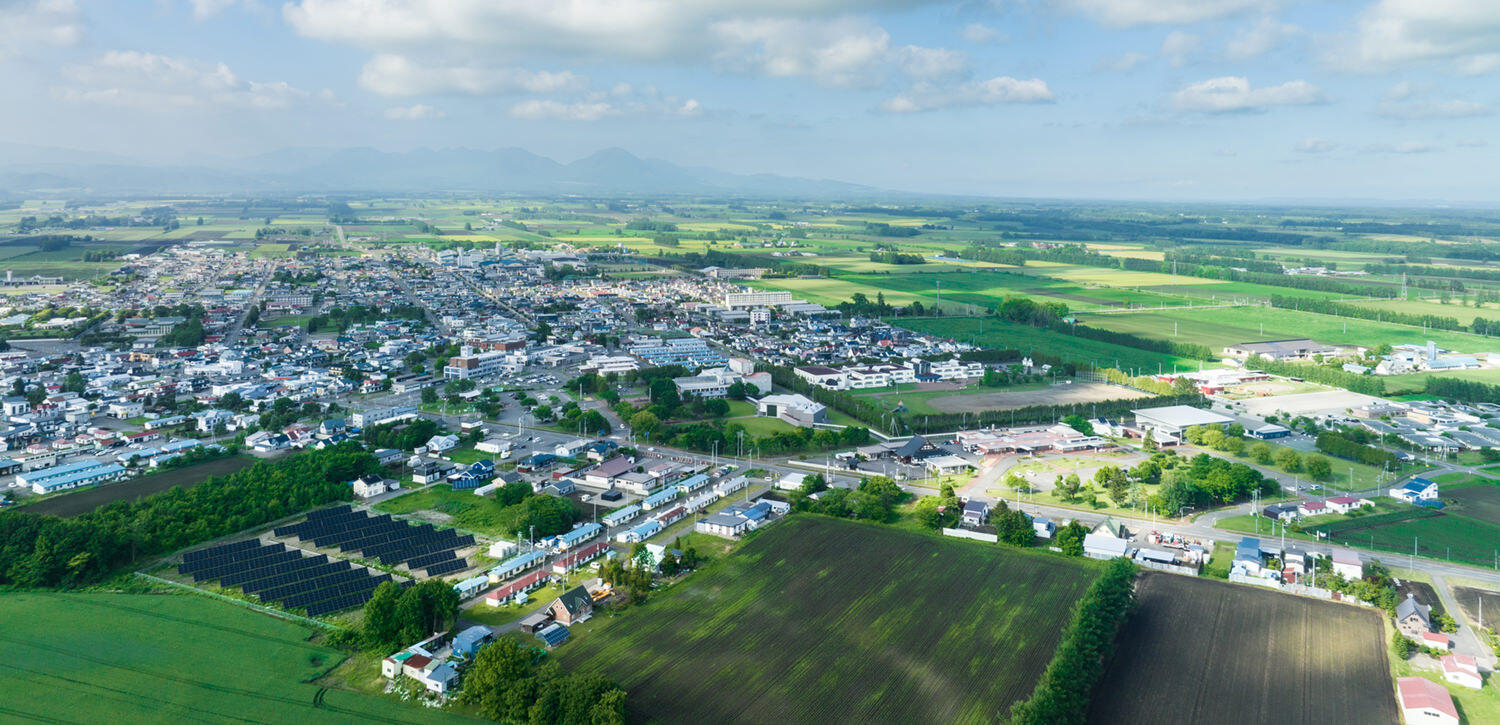
In addition, Pacific Power Co., Ltd., one of our group companies, has established and operated 17 new municipal power producers and suppliers companies, and is expanding its track record mainly in the new municipal power power producers and suppliers businesses, which also contributes to regional revitalization and resilience. In recent years, it has also started a wide range of energy management businesses, such as solar PPA and capacity markets including VPP.
[Why regional decarbonization now? Toward promoting regional GX]
Furthermore, in terms of supporting efforts toward decarbonization not only in Japan but also overseas, we have many years of experience in examining JCM methodologies and supporting the formulation of energy conservation and renewable energy projects in relevant countries.
Of course, we are also actively working to reduce CO2 emissions from our own activities, and in April 2024, we obtained certification for the SBT Net Zero target for greenhouse gas reduction. This was obtained from the SBT Initiative, an organization that certifies "Science Based Targets," greenhouse gas Emission Reduction Targets are scientifically consistent with the goals set out in Paris Agreement. As of Mar. 2024, there are 15 domestic companies (excluding small and medium-sized enterprises) that have obtained similar Long-Term Targets certification, and this is the first time that we have obtained this certification in the construction consulting industry.
PACIFIC CONSULTANTS' strength lies in its ability to support not only the upstream policy and concept stages, but also on-site implementation and operation, including actual facility construction and construction management, consensus building and coordination among a wide range of stakeholders, and comprehensive project management.We will continue to utilize our comprehensive capabilities to provide total support for environmental issues in a broad sense, including decarbonization and climate change measures, from policy formulation to conceptual planning by companies and local governments and on-site social implementation.



